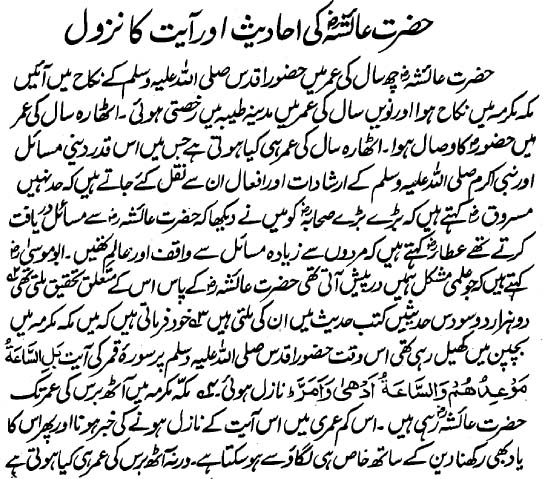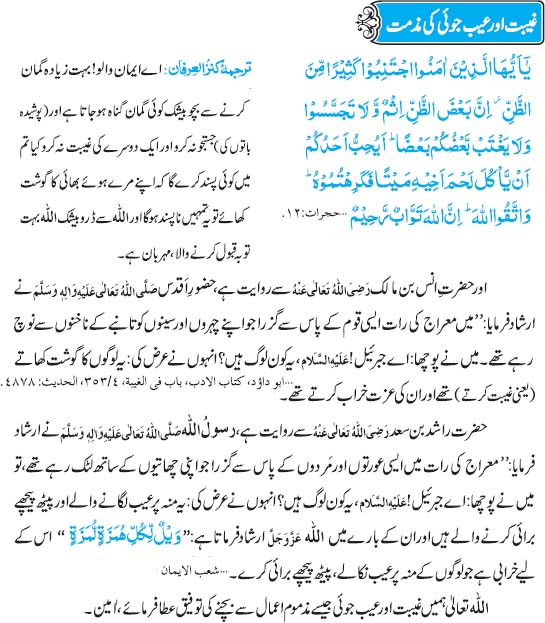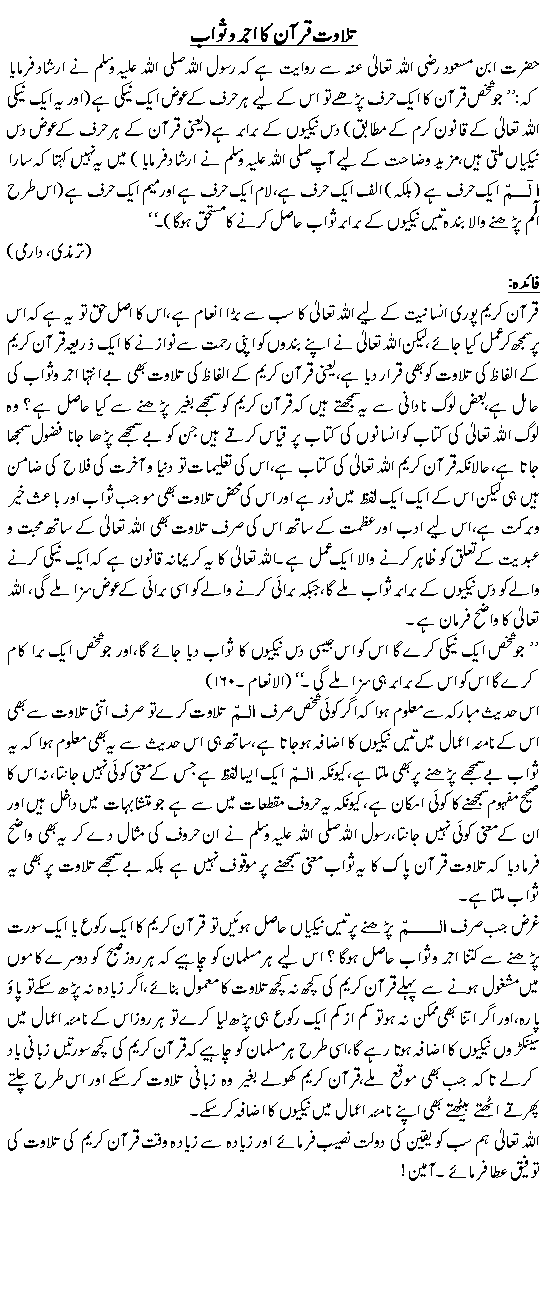
Har Haal Me Allah Ka Zikr
Ubaid And The Temptress
Ubaid ibn Umair Rahimahullah was a pious man who was highly regarded by his contemporaries. At that time, there was a very beautiful woman who lived in Makkah with her husband. One day she was looking at herself in the mirror, and she asked her husband, “Is there any man who will see this face of mine, but will not be tempted by it?”
He replied, “Yes.”
She asked, “Who?”
He answered, “Ubaid ibn Umair.”
She asked, “Do you allow me to tempt and entice him?”
He agreed. She approached Ubaid ibn Umair, pretending to ask him a question of importance. When they were in a corner of Masjidul Haraam she unveiled her face, and it shone like the full moon.
Ubaid asked her, “O slave of Allah, what would you like to ask?”
She replied, “I am infatuated by you. Please consider my request.”
Ubaid replied, “I would like to ask you a few questions. If you reply truthfully, I will consider your request.”
She remarked, “I will most certainly reply truthfully to any questions you pose to me.”
Ubaid asked, “If the angel of death comes to take your soul, would you be pleased that I fulfill your request at that time?”
She replied, “By Allah, never!”
Ubaid then said, “You have been truthful. If you are lowered into your grave and about to be questioned by the angels, would you be pleased that I fulfill your request at that time?”
She replied, “By Allah, never!”
Ubaid then said, “You have been truthful. When people are given their book of deeds, and you do not know whether you will receive yours in your right or left hand, would you be pleased that I fulfill your request at that time?”
She replied, “By Allah, never!”
Ubaid then said, “You have been truthful. If you are about to cross the bridge of Siraat and you do not know whether you will make it across, would you be pleased that I fulfill your request at that time?”
She replied, “By Allah, never!”
Ubaid then said, “You have been truthful. When the scales of deeds are brought, and you do not know whether yours is heavy or light, would you be pleased that I fulfill your request at that time?”
She replied, “By Allah, never!”
Ubaid then said, “You have been truthful. When you are standing before Allah to answer for your deeds, would you be pleased that I fulfill your request at that time?”
She replied, “By Allah, never!”
Ubaid then said to her, “You have been truthful. Fear Allah, O slave of Allah! Allah has bestowed you with bounties and has been kind to you.”
The woman then returned to her husband, who asked, “What happened?”
She replied, “We have been wasting away our lives until now.” She then dedicated her time to Salah, fasting, and other forms of worship. Thereafter, her husband would often remark, “What has Ubaid done to me? Every night she was like a bride, and now she has no inclination to the world.” (Ath Tiqaat, Ajali)
Lesson: A believer who contemplates over these questions at the time of committing a sin will realize his weakness and abstain from the sin.
Jannat Ki Naimat Naimatien Quran Ki Zabani

Jannat Ki Naimat Naimatien Quran Ki Zabani
Etiquette With Visitors
The best action of Islam is to feed the poor. Rasullullah sallAllahu alayhi wasallam has said: “The person who has faith in Allah and in the hereafter, it is necessary for him to be polite to his guests.” (Bukhari)
One remains a guest for three days; thereafter, it is sadaqah. (The host must entertain his guest for three days. More than that, whatever entertainment is made will be regarded as sadaqah).
One should entertain one’s guest with special food for one day and one night. (Bukhari)
A guest should not remain at the host’s place for such a long time that it would either inconvenience or disgust them.
Whoever is invited and does not accept has disobeyed Allah and His Rasul sallallahu alayhi wasallam.
Whoever enters (a house) without invitation (for meals), enters as a burglar and departs as a bandit. (Abu Dawud)
Hazrat Aisha (radi Allahu anha) Ki Ahadith Aur Ayat Ka Nuzool

Hazrat Aisha (radi Allahu anha) Ki Ahadith Aur Ayat Ka Nuzool
Miscellaneous Ahadith Of The Day
Hadith – 1
Narrated Anas bin Malik (May Allah Subhanahu wa ta’ala be pleased with him). The Prophet (May Peace, blessings and mercy of Allah Subhanahu wa ta’ala be on him) said, “Take Suhur as there is a blessing in it.”
Sahih Bukhari: Volume 3, Book 31, Number 146
Hadith – 2
Narrated Aisha (May Allah Subhanahu wa ta’ala be pleased with her) (the wife of the Prophet(May Peace, blessings and mercy of Allah Subhanahu wa ta’ala be on her)), Hamza bin ‘Amr Al-Aslami asked the Prophet (May Peace, blessings and mercy of Allah Subhanahu wa ta’ala be on him), “Should I fast while traveling?” The Prophet replied, “You may fast if you wish, and you may not fast if you wish.”
Sahih Bukhari:Volume 3, Book 31, Number 164
Hadith -3
Narrated Jarir (May Allah Subhanahu wa ta’ala be pleased with him), When I gave the pledge of allegiance to Allah’s Apostle (May Peace, blessings and mercy of Allah Subhanahu wa ta’ala be on him) and he (May Peace, blessings and mercy of Allah Subhanahu wa ta’ala be on him) stipulated that I should give good advice to every Muslim.
Sahih Bukhari:Volume 3, Book 50, Number 875
Hadith -4
Narrated Sahl bin Sad (May Allah Subhanahu wa ta’ala be pleased with him), I used to take my Suhur meals with my family and then hurry up to present myself for the (Fajr) prayer with Allah’s Apostle (May Peace, blessings and mercy of Allah Subhanahu wa ta’ala be on him).
Sahih Bukhari:Volume 3, Book 31, Number 143
Hadith – 5
Narrated Abu Huraira (May Allah Subhanahu wa ta’ala be pleased with him), I heard Allah’s Apostle (May Peace, blessings and mercy of Allah Subhanahu wa ta’ala be on him) saying, “If there was a river at the door of anyone of you, and he took a bath in it five times a day, would you notice any dirt on him?” They said, “Not a trace of dirt would be left.” The Prophet (May Peace, blessings and mercy of Allah Subhanahu wa ta’ala be on him) added, “That is the example of the five prayers with which Allah blots out (annuls) evil deeds.”
Sahih Bukhari: Volume 1, Book 10, Number 506
Hadith – 6
Narrated Abu Huraira (May Allah Subhanahu wa ta’ala be pleased with him), Allah’s Apostle (May Peace, blessings and mercy of Allah Subhanahu wa ta’ala be on him) said, “For every prophet there is one (special invocation (that will not be rejected) with which he appeals (to Allah), and I want to keep such an invocation for interceding for my followers in the Hereafter.”
Sahih Bukhari: Volume 8, Book 75, Number 317
Hadith – 7
Narrated Abu Huraira (May Allah Subhanahu wa ta’ala be pleased with him), Allah’s Apostle (May Peace, blessings and mercy of Allah Subhanahu wa ta’ala be on him) said, “When Allah completed the creation, He wrote in His Book which is with Him on His Throne, “My Mercy overpowers My Anger
Sahih Bukhari:Volume 4, Book 54, Number 416
Gheebat Aur Aib Joi Ki Muzammat

Gheebat Aur Aib Joi Ki Muzammat
Allah’s Saying: O My Servants
Allah’s Saying: O My Servants
[Sahih Muslim: Book 32, Number 6246]
Abu Dharr (Radi Allah Anhu) reported Allah’s Messenger (sal-allahu-alleihi-wasallam) as saying that Allah, the Exalted and Glorious, said: “O My servants, I have made oppression unlawful for Me and unlawful for you, so do not commit oppression against one another.”
“O My servants, all of you are liable to err except one whom I guide on the right path, so seek right guidance from Me so that I should direct you to the right path.
“O My servants, all of you are hungry (needy) except one whom I feed, so beg food from Me, so that I may give that to you.”
“O My servants, all of you are naked (need clothes) except one whom I provide garments, so beg clothes from Me, so that I should clothe you.”
“O My servants, you commit error night and day, and I am there to pardon your sins, so beg pardon from Me so that I should grant you pardon.”
“O My servants, you can neither do Me any harm nor can you do Me any good.”
“O My servants, even if the first amongst you and the last amongst you and even the whole of the human race of yours, and that of jinns even, become (equal in) God-conscious like the heart of a single person amongst you, nothing would add to My Power.”
“O My servants, even if the first amongst you and the last amongst you and the whole human race of yours and that of the Jinns too in unison become the most wicked (all beating) like the heart of a single person, it would cause no loss to My Power.”
“O My servants, even if the first amongst you and the last amongst you and the whole human race of yours and that of jinns also all stand in one plain ground, and you ask Me and I confer upon every person what he asks for, it would not. In any way, cause any loss to Me (even less) than that which is caused to the ocean by dipping the needle in it.”
“O My servants, these for you I shall reward you for than, so he who deeds of yours which I am recording finds good should praise Allah and he who does not find that should not blame anyone but his own self.”
Sa’id said that when Abu Idris Khaulini (Radi Allah Anhu) narrated this hadith, he knelt upon his knees.
Our Lord! Grant us good in this world and good in the hereafter, and save us from the chastisement of the fire.
Tilawat-e-Quran ka Ajar Aur Sawab

Seeking Refuge With Allah
Seeking Refuge with Allah – Tafsir Ibn Kathir – Surah Fatihah
“Authu Billahi min-ash Shaytani Rajim”
(I seek refuge with Allah from the cursed Satan)
“I seek refuge with Allah from the cursed Satan so that he is prevented from affecting my religious or worldly affairs, or hindering me from adhering to what I was commanded, or luring me into what I was prohibited from.
Indeed, only Allah can prevent the evil of Satan from touching the son of Adam. This is why Allah allowed us to be lenient and kind with the human devil, so that his soft nature might cause him to refrain from the evil he is indulging in.
However, Allah required us to seek refuge with Him from the evil of Satan, because he (satan) neither accepts bribes nor does kindness affect him, for he is pure evil. Thus, only He Who created Satan can stop his evil.
This meaning is reiterated in only three Ayat in the Quran. Allah said in Surat Al-Araf: “Show forgiveness, enjoin what is good, and turn away from the foolish (i.e., don’t punish them).” [Noble Quran 7:199]
This is about dealing with human beings. He then said in the same Surah: “And if an evil whisper comes to you from Shaitan, then seek refuge with Allah. Verily, He is Hearing, Knowing” [Noble Quran 7:200]
Allah also said in Surat Al-Muminun: “Repel evil with that which is better. We are best acquainted with the things they utter. And say: “My Lord! I seek refuge with You from the whisperings (suggestions) of the Shayatin (devils). And I seek refuge with You, My Lord! Lest they should come near me. [Noble Quran 23:96-98]
Further, Allah said in Surat As-Sajdah: “The good deed and the evil deed cannot be equal. Repel (the evil) with one which is better, then verily he, between whom, and you, there was enmity, (will become) as though he was a close friend. But none is granted it (the above quality) except those who are patient, and none is granted it except the owner of the great portion (of happiness in the Hereafter, i.e., Paradise and of a high moral character) in this world. And if an evil whisper from Shaitan tries to turn you away (from doing good), then seek refuge in Allah. Verily, He is the Hearing, the Knowing” [Noble Quran 41:34-36]
The Tafsir of Istiadthah (seeking Refuge)
These are the only three Ayat that carry this meaning. Allah commanded that we be lenient human enemies, so that his soft nature might make him an ally and a supporter. He also commanded that we seek refuge from the satanic enemy, because the devil does not relent in his enmity if we treat him with kindness and leniency. The devil only seeks the destruction of the Son of Adam due to the vicious enmity and hatred he has always had towards man’s father, Adam. Allah said:
“O Children of Adam! Let not Shaitan deceive you, as he got your parents (Adam and Hawa (Eve) out of Paradise)” [Noble Quran 7:27]
“Surely, Shaytan is an enemy to you, so take (treat) him as an enemy. He only invites his Hizb (followers) that they may become the dwellers of the blazing Fire.” [Noble Quran 35:6]
“Will you then take him (Iblis) and his offspring as protectors and helpers rather than Me, while they are enemies to you What an evil is the exchange for the Dthalimun (polytheists, and wrongdoers, etc.)” [Noble Quran 18:50]
The devil assured Adam that he wanted to advise him, but he was lying. Hence, how would he treat us after he had vowed:
“By Your might, then I will, surely, mislead them all. Except Your chosen servants among them (i.e., faithful, obedient, true believers of Islamic Monotheism).” [Noble Quran 38:82-83]
Also, Allah said: “(So when you) want to recite the Quran, seek refuge with Allah from Shaitan, the outcast (the cursed one). Verily, he has no power over those who believe and put their trust only in their Lord (Allah). His power is only over those who obey and follow him (Satan), and those who join partners with Him.” [Noble Quran 16:98-100]
Khadejah Jones

